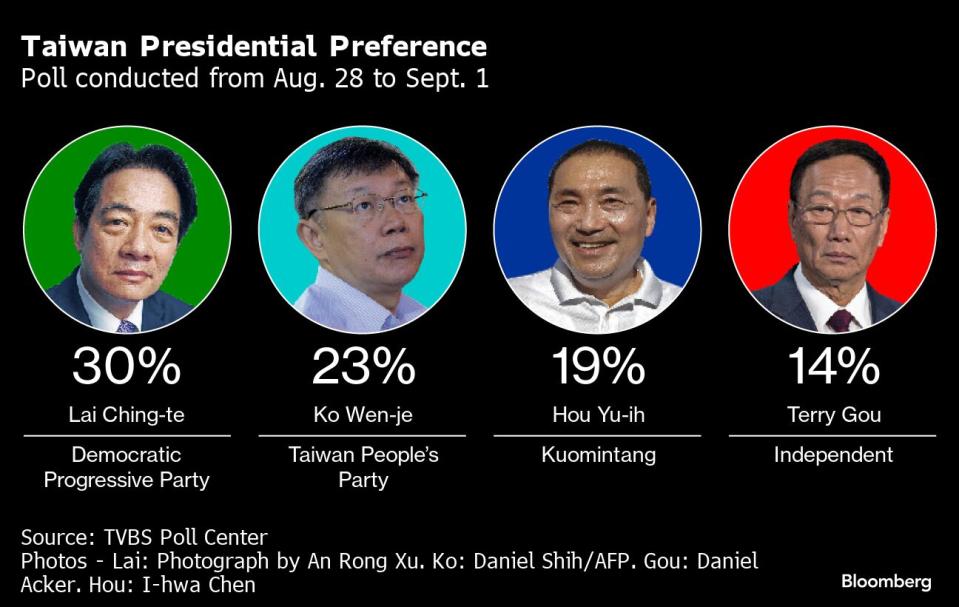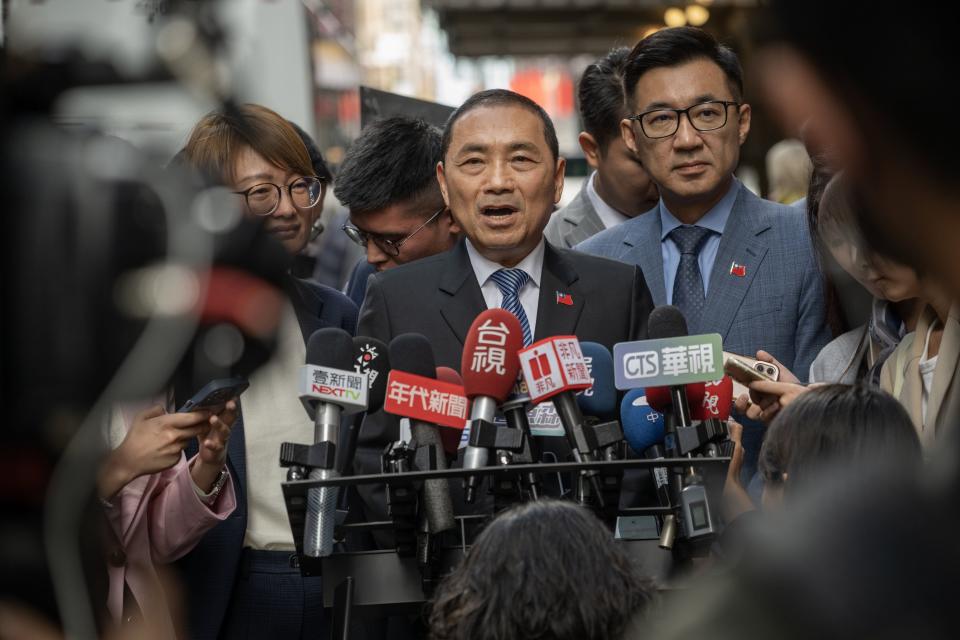Taiwan’s Former Top Cop Wants China Talks If Voted President
(Bloomberg) -- One thing Hou Yu-ih wants Taiwan’s voters to know about him as they prepare to elect a new president is that he used to be a great cop.
Most Read from Bloomberg
Ex-Goldman Bankers Make a Fortune With Controversial Bet on Coal
‘Dead Space’ Co-Creator Departs Startup After Newest Game Flops
The 66-year-old’s decades-long career, which saw him work his way up from a police officer to become Taiwan’s top law enforcement official, is a core part of the image he’s projecting ahead of the election in January 2024. Hou’s pitch is simple. His time working as a cop in very high-stakes situations makes him the best choice to manage one of the world’s most-dangerous geopolitical hot spots as Taiwan’s next president.
“I have participated in countless gun battles and I always stood on the front line,” Hou said during an interview in New York on Saturday. “Facing down opponents in a hostage situation teaches you that whether you’re on the offensive or the defensive, you must also engage in dialogue and negotiations.”
He has a lot of work to do. Polling by broadcaster TVBS in August put Hou, running as the candidate of the opposition Kuomintang, in third place with 19% support. Lai Ching-te, the nominee for the ruling Democratic Progressive Party, was in the lead with 30%, followed by Ko Wen-je, who’s running as the candidate of a party he founded in 2019. Billionaire founder of Foxconn Group Terry Gou, who Hou defeated for the KMT nomination, is running as an independent and polling in fourth.
In addition to being cool under pressure, Hou’s campaign has also argued that he’d be able to open lines of communication with Beijing, something current president Tsai Ing-wen, also a member of the DPP, hasn’t been able to do since she first took office in 2016. Dialogue would make Taiwan safer by reducing the potential for misunderstanding and would also improve business links with the island’s biggest trading partner, Hou’s team have argued.
The main stumbling block to dialogue over the past eight years has been an understanding between the two sides known as the “92 Consensus,” which essentially says that Taiwan is part of China. Beijing has insisted that Tsai, like her predecessor, must first affirm the 92 Consensus before there can be talks. Tsai and Lai, who currently serves as her vice president, have both said that isn’t something they’ll do, suggesting if Lai were to win that the communications freeze would continue.
Ko, running as the nominee of the Taiwan People’s Party, said in an interview earlier this month that he wouldn’t outright reject the 92 Consensus in order to keep the door open for talks with Beijing, even though he felt there was “no market” for the understanding among the island’s population. Gou has indicated he’d affirm the 92 Consensus.
Asked in New York if he saw any value in the 92 Consensus, Hou responded that he has “the responsibility to protect the lives of 23 million people and to ensure the sustainable prosperity of this land. This is my responsibility.”
A few days after that interview, which took place as part of a US trip that also included stops in Washington DC and San Francisco, Hou published an article in Foreign Affairs magazine that affirmed his support of the understanding. “I support the 1992 Consensus, the approach to cross-strait dialogue agreed to by Taiwanese officials and counterparts from the mainland,” he wrote.
The relationship with China is the top issue facing Taiwan’s voters. Beijing, which considers the island a part of its territory, has pledged to take control of Taiwan, by force if necessary. With the US having long been the guarantor of the island’s security, that’s fueled concerns about a potential military conflict between the world’s biggest economies.
In addition to dialogue, Hou also stressed that he’d seek to bolster Taiwan’s military capabilities by increasing defense spending to more than 2.5% of gross domestic product. He said he was open to spending increasing to 3% or more of GDP, though emphasized the need to spend wisely because of the disparity in military budgets between Taiwan and China.
“No matter how the mainland changes, we must be prepared and we must have strength,” Hou said. “Sun Tzu’s Art of War said: ‘Don’t rely on the enemy not coming, rely on me being prepared to wait for him.’”
As Hou was traveling in the US, where he met with members of the US Congress as well as State Department and national security officials, China’s People’s Liberation Army sent a record 103 warplanes and nine ships into the vicinity of Taiwan through Sunday and into the early hours of Monday. Those sorties coincided with visits to Taipei by US Under Secretary of Commerce Laurie Locascio and the governors of Arizona and New Mexico. Beijing has long protested visits by American officials to the island.
The current state of ties across the Taiwan Strait are a far cry from where they were eight years ago, during the final days of the last KMT president’s term in office. Then-President Ma Ying-jeou traveled to Singapore in November 2015 for a historic face-to-face meeting with Chinese President Xi Jinping. Since, there has a been a US-China trade war, a global pandemic, Russia’s invasion of Ukraine and a series of American sanctions that have cut off Beijing’s access to advanced semiconductors.
Asked if he’d seek a meeting with Xi as Ma did, Hou downplayed the possibility. What is most needed now, he said, was stability in the relationship. To do that, Taiwan has to first improve its own defense capabilities and then to seek dialog with Beijing.
“The situation at that time was completely different from how things are now,” Hou said. “At this stage, Taiwan is facing constant conflicts, and it would be easy to spark a conflict accidentally and trigger a war. We must be prepared to face a conflict that could trigger a full-on war at any time.”
Most Read from Bloomberg Businessweek
©2023 Bloomberg L.P.

 Yahoo News
Yahoo News 


